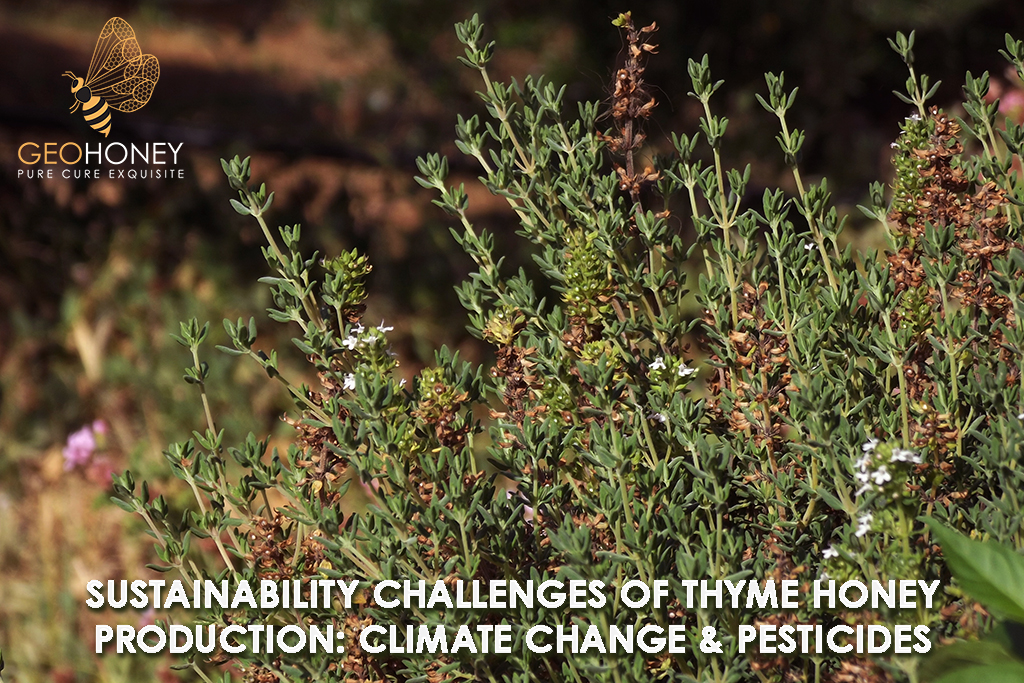- Tokyo: 10:00
- Singapore: 09:00
- Dubai: 05:00
- London: 01:00
- New York: 20:00
Sustainability Challenges of Thyme Honey Production | Climate Change & Pesticides

Honey has been a staple food and a natural sweetener for centuries. It is used in many recipes, and its health benefits are well-documented. Thyme honey, in particular, is a sought-after variety due to its unique flavour and medicinal properties. However, raw thyme honey production faces several sustainability challenges, including the impact of climate change and pesticide use on thyme plant populations and bee health.
Thyme is a perennial herb that grows in warm, sunny climates with well-drained soil. It is native to the mediterranean region and is widely used in traditional medicine for its antibacterial, antifungal, and antioxidant properties. Raw Thyme honey is produced by bees that collect nectar from thyme flowers. The honey is known for its distinctive aroma, golden colour, and rich flavour.
Impact of climate change and pesticide use on thyme plant populations and bee health:
Climate change is one of the most significant challenges facing thyme honey production
Rising temperatures, changing rainfall patterns, and extreme weather events are affecting thyme plant populations, making it more difficult for bees to collect nectar. Thyme plants require a specific balance of heat, water, and nutrients to grow and produce nectar. As the climate changes, this balance is being disrupted, leading to reduced nectar production and honey yields.
Moreover, climate change is also affecting the timing of the blooming period of thyme plants. In many areas, thyme is blooming earlier than usual, which means that bees may miss the peak nectar production period. This can result in lower honey yields and lower-quality thyme honey. Additionally, climate change is also altering the distribution and abundance of pollinators, which can affect the quantity and quality of honey produced.
Pesticide use is another significant sustainability challenge facing thyme honey production
Farmers often use pesticides to protect their crops from pests and diseases. However, pesticides can also harm bees and other pollinators, leading to reduced honey yields and lower-quality organic thyme honey.
Pesticides can affect bee health in several ways. Some pesticides can kill bees directly, while others can affect their behaviour and immune system. Pesticides can also contaminate the nectar and pollen that bees collect, which can harm the bees and reduce the quality of the honey they produce. Moreover, the use of pesticides can also affect the quality of thyme nectar. Pesticides can kill the insects that pollinate thyme plants, reducing their reproductive success and nectar production. This can lead to reduced honey yields and lower-quality organic thyme honey.
To address the sustainability challenges facing thyme honey production, farmers and beekeepers can take several steps
They can adopt sustainable farming practices that reduce their dependence on pesticides and promote soil health. For example, they can use crop rotation, cover crops, and organic fertilisers to maintain healthy soil and reduce pest and disease pressure.
Additionally, farmers can use integrated pest management (IPM) practices to control pests and diseases. IPM involves using a combination of biological, cultural, and chemical methods to manage pests and diseases while minimising harm to pollinators and other beneficial insects. Farmers can also work with beekeepers to promote the health and well-being of their bees.
Moreover, beekeepers can take steps to promote the health of their bees and reduce their reliance on wild thyme nectar. For example, they can provide their bees with a diverse diet of nectar and pollen from a variety of plants. This can help ensure that the bees have access to sufficient nutrients and reduce their exposure to pesticides and other toxins.
In Conclusion
Wild Thyme Honey production faces several sustainability challenges, including the impact of climate change and pesticide use on thyme plant populations and bee health. To address these challenges, farmers and beekeepers must adopt sustainable farming and beekeeping practices that promote the health and well-being of their bees and the environment. Consumers can also play a role by supporting sustainable thyme honey production and choosing honey from responsible sources.
Thyme honey is a valuable natural resource that provides economic, ecological, and health benefits. However, to ensure the long-term sustainability of thyme honey production, we must address the challenges posed by climate change and pesticide use. By working together and adopting sustainable practices, we can help protect thyme plant populations, bee health, and the environment while producing high-quality raw thyme honey.




We thought this pesticide doesn't cause any harm to bees, but it definitely is and especially to the food we are taking in also.